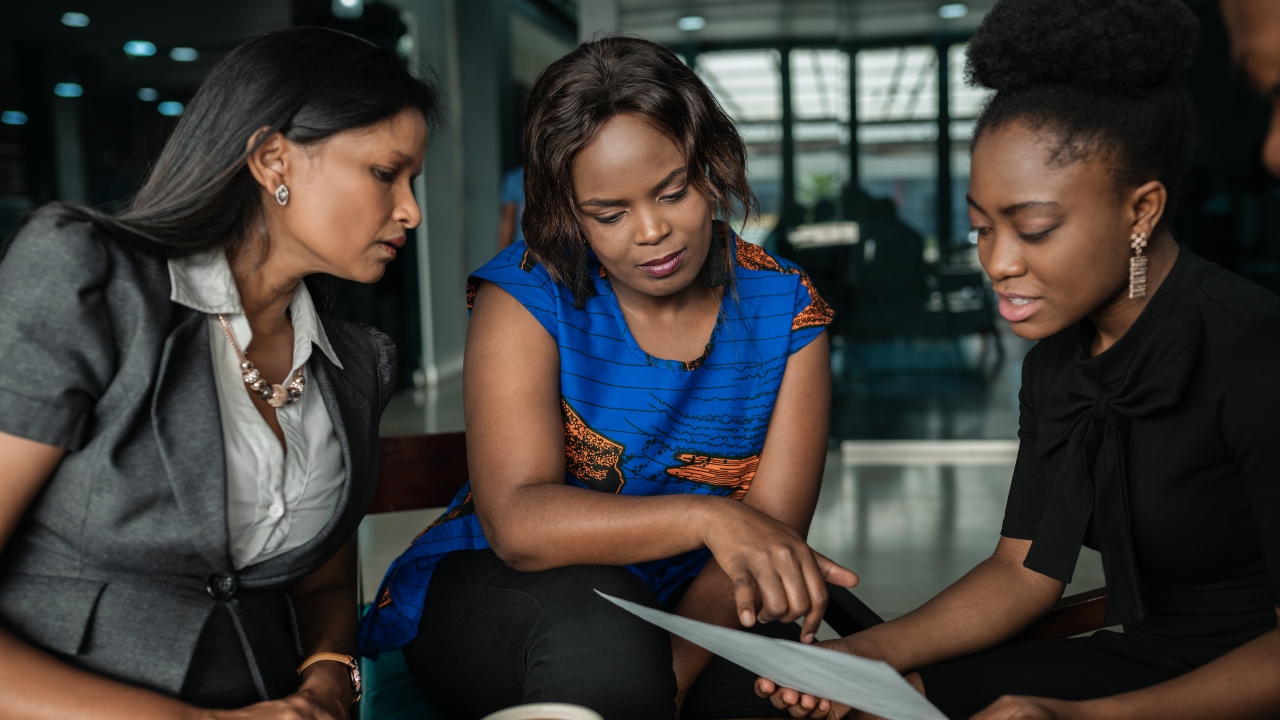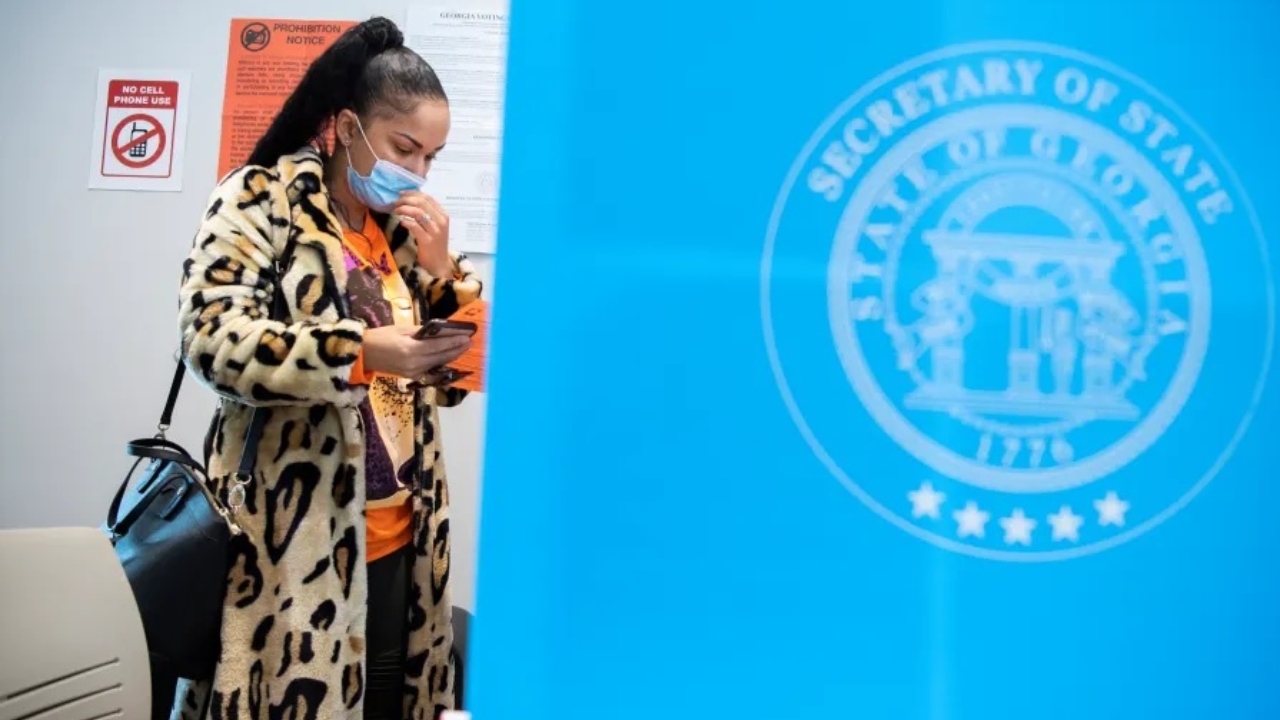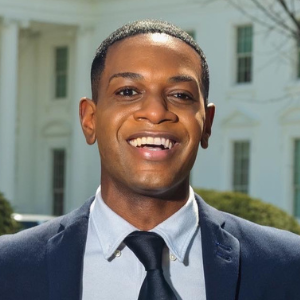A survey from Goldman Sachs’ One Million Black Women initiative reveals Black women earn less than the general U.S. population and owe more in student and medical debt.
Since the historic election of America’s first Black president, Barack Obama, Black women have been lifted up as the backbone of the Democratic Party.
The high turnout rate among Black female voters led to many critical victories for Democrats over the years, most notably the election of Joe Biden as president and Kamala Harris as America’s first Black female vice president.
Despite their outsized political power at the ballot box, however, a new national survey conducted by Goldman Sachs’ One Million Black Women public policy initiative reveals Black women suffer the most in the U.S. economy.
The survey results — exclusively reported by theGrio — provide insight into the stark economic realities for Black women, who earn less than the general U.S. population and owe more in student and medical debt.
The findings come from the first-ever Money Matters: One Million Black Women Economic Mobility Survey, which surveyed 2,500 U.S. adults.
Among the many findings, the survey revealed that Black women, who are often the heads of households, are more likely to earn less than $50,000 before taxes, have fewer full-time salaried jobs and are seeking gig work at higher rates than the broader population.
There are also residual economic barriers that come with low-wage and non-salaried work. For example, only 43% of Black women received health insurance through their employer, compared to 53% nationwide. And despite 56% of U.S. adults receiving paid sick leave from their employer, only 50% of Black women receive that benefit.
Black women are also saddled with disproportionate debt. The One Million Black Women survey finds that 37% of Black women have medical debt compared to 29% of U.S. adults, and 64% of Black women with student loan debt owe more than $25,000, compared to 55% of the population.
Additionally, 19% of Black women seeking employment reported that childcare is a barrier affecting their job search, compared to 11% of all U.S. adults.
This stark economic data may explain why the One Million Black Women survey also found that jobs and the economy are a top concern (22%) for Black women ahead of the 2024 elections, coming only second to concerns about the future of democracy (24%).
Melanie L. Campbell, president and CEO of the National Coalition on Black Civic Participation and a member of the One Million Black Women Advisory Council, told theGrio that the new survey results would be crucial for policymakers who have the ability to craft policy to close the longstanding economic gaps for Black women.
“You can’t make good policy without good data,” said Campbell. “Policy is a part of being able to impact systemic change.”
Campbell said actions that the federal government could take to improve economic outcomes for Black women include expanding access to “quality” childcare, establishing federal standards for paid family and sick leave, canceling student debt and improving access to capital for small business owners.
While policymakers call on the public sector to do what is necessary to help Black women thrive in the U.S. economy, One Million Black Women aims to do that through private investment and philanthropic endeavors.
Asahi Pompey, global head of corporate engagement at Goldman Sachs, told theGrio that through this national survey, “We really wanted to shed light on the economic realities of Black women to really understand the key drivers and, ultimately, trigger a conversation around informed real solutions to the challenges.”

Pompey has led One Million Black Women since the initiative — which is aimed at investing $10 billion toward creating economic opportunity for at least one million Black women by 2030 — was launched in March 2021.
In an effort to turn the tide for Black women who are often drowning in economic hardships, Goldman Sachs is also investing $100 million in philanthropic capital to Black women entrepreneurs over the next decade.
“Black women start businesses faster than any other demographic in the United States. And yet … three years later, 97% of those businesses are no longer in business, and sometimes she’s in a far more difficult position,” said Pompey, who is the highest-ranking Black woman at Goldman Sachs.
“Our Black in Business initiative was really born to sort of turn that trend around,” she continued, “and really be able to help Black women who are starting businesses be able to succeed.”
Erica Bigger, a small business owner in Baltimore, is one of the Black women who have benefited from OMBW’s Black in Business Cohort 2 program. The single mother told theGrio that despite all that she gained from the program to manage her business better, she continues to struggle economically due to a host of barriers like the cost of childcare, healthcare and mounting student debt. Bigger also works side jobs in order to live while she works to expand her business.
“I have a degree, and it’s still hard for me to get a job making over a certain amount of salary,” said Bigger, a graduate of the University of Maryland Eastern Shore and Fashion Institute of Technology.
Still, despite the economic challenges that Black women endure, the Goldman Sachs survey found that 63% of Black women remain optimistic about their future.
“I’m not wavering from being optimistic and believing in my dreams,” Bigger told theGrio. “I’m fully committed to investing my all and nurturing my business and securing a brighter future for my child and my family – that’s what’s gonna keep me going.”
The national survey also found that Black women are motivated to vote in the upcoming 2024 elections, where their turnout has decided crucial elections. Of those surveyed, 86% of Black women said they would definitely or probably vote in the 2024 presidential election.
Bigger said she “definitely” plans to vote on Nov. 5, 2024, telling theGrio, “I’m going to be doing my research …but I definitely want [candidates] to really take time to know the information … the statistics and the numbers.”
“These are real people,” she added, “and this is their livelihood.”
Campbell, who is also the convener of the Black Women’s Roundtable, told theGrio that while on her “Power of the Ballot” national tour, she and others are getting an early start with mobilizing Black voters, particularly Black women.

“Black women are still gonna be the drivers of the Black vote,” said Campbell. “As we get closer to the election, those numbers will grow.”
Pompey said through Goldman Sachs employees and the Black women they work with in OMBW, the company sees that people are “very engaged” and “care about the direction of our country.”
“It’s a platform that we fully support. I think that can only be better for our country to have more people that are engaged generally,” she said.
Pompey said the launch of the national survey is the start of what will be recurring. She told theGrio: “We want to be able to have really salient data every single time.”
Ultimately, the work to narrow the earning gaps for Black women will benefit everyone, as noted by Goldman Sachs research that concluded that doing so could raise the U.S.’ annual GDP by as much as 2.1% each year and has the potential to generate 1.2 million to 1.7 million American jobs.
“With collective investment from the private sector and the public sector, and that grit, determination, and optimism of Black women,” said Pompey, “there’s a real opportunity here for us to make a lasting impact.”

Gerren Keith Gaynor is a White House Correspondent and the Managing Editor of Politics at theGrio. He is based in Washington, D.C.
TheGrio is FREE on your TV via Apple TV, Amazon Fire, Roku, and Android TV. Please download theGrio mobile apps today!
The post New election data reveals key findings about Black women and the economy appeared first on TheGrio.


